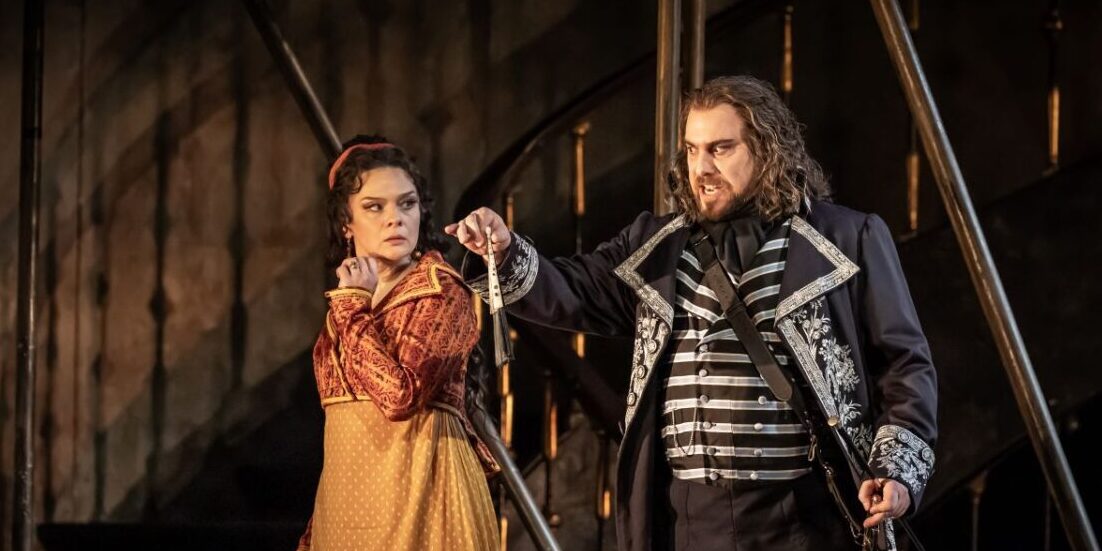Puccini set Sardou’s play La Tosca to music after Sarah Bernhadt performed it in French, despite never understanding a word. Ilica and Giacosa gave the libretto a different ending where, cradling Cavaradossi’s dead body, Tosca has a mad scene and dies. Sardou objected, so Tosca jumps off Castel Sant’Angelo instead.
Puccini climbed the parapet of Castel Sant’Angelo before dawn, writing on manuscript the exact pitches and rhythms of the bells heard at dawn, including St. Peter’s dome. These are recreated in Act III prelude. Nobody had composed anything like it.
The action is set on June 17th 1800, the day when news reached Rome of Napoleon’s defeat at Marengo. Napoleon wanted a single republic for the numerous self-governing Italian states. The pope fled; Rome was declared a republic with its Roman consul, Angelotti. Most Romans did not want a republic, it collapsed; Angelotti was imprisoned.
Tosca is an intense psychological drama of lust and political manipulation, under the oppressive regime of the Chief of Secret police, Scarpia. Tosca, a great diva is driven by her love for Cavaradossi, an artist with liberal politics. Scarpia wants to eliminate Cavaradossi, taking Tosca for himself. Tosca is based on real characters and events, except that the ‘uccisione simulato’ (fake execution) of Palmieri, is fiction.
Despite rapturous first night applause, the critics hated the violence and brutal orchestration, calling Tosca – ‘a shabby little shocker’. How wrong they were!
This is the 14th revival of Jonathon Kent’s spectacular production with gorgeous period costumes, using huge, lavishly imposing sets, realistically recreating the Church of Sant’Andrea della Valle, Palazzo Farnese and Castel Sant’Angelo.
Lithuanian soprano Aušrine Stunyete’s planned ROH debut was as Tosca. At short notice, she substituted Nina Stemme as Elektra, making a successful ROH debut as Elektra instead. Immediately on entry, Stunyete is jealous, fiery, passionate, and religious at the flip of a coin. The voice is beautiful, full of expression and thrilling; she is an excellent actress.
Italian baritone Gabriele Viviani is terrific as Scarpia. Born in Puccini’s home town of Lucca, Puccini is in his bones; Scarpia fits him like a glove. Viviani dominates from his first entry. His Scarpia is terrifying. ‘Va, Tosca’ is perfectly sung. He possesses beauty of tone, lovely legato lines; his phrases can be seductive, warm and lyrical or evil at whim. He is a good actor, instantly plotting and planning, eyes flashing everywhere, noticing everything, licking his lips when he has Tosca cornered.
The dramatic success of Tosca hinges on Act 2 – the showdown between Tosca and Scarpia whilst Cavaradossi is being tortured. Both must be great singing actors to pull it off. Stunyete and Viviani do just that. The psychological fight between the two is riveting. Tosca sings ‘vissi d’arte’ cowering inside a huge statue. The end – ‘perché Signor ah, ah, me ne rimuneri cosí’ is stunning. I always listen to how the A to G on Ah is sung, because that phrase makes the aria; Stunyete is perfect. She gives a warm, dramatic and very physical performance. Viviani gives an equally physical performance, totally dominating and mentally torturing Tosca. It is exciting stuff.
Much of Act 2 happens with Scarpia behind his desk/dining table, stage left. Those sitting that side cannot see the important drama unfolding there. This is the crux of the opera. Could the table be moved further centre-stage so everyone can see?
Argentinian tenor Marcelo Puente as Cavaradossi starts shakily. ‘Recondita l’armonia’ sounds unclear. ‘Vittoria, vittoria’ in Act 2 is fantastic. ‘E lucevan le stelle’ suffers similarly. The top is not free; there are intonation problems. Puente looks good, he acts well; the problems may be due to the bugs going around. A voice is fragile, and the first thing to be affected.
25-year-old Armenian multi-prizewinning baritone Grisha Martirosyan as Angelotti is a current Jette Parker student. His rich, rounded, voice and good acting heralds a future star. British bass-baritone Henry Waddington as Sacristan is excellent. These minor roles are strongly cast.
The singers are occasionally drowned by the orchestra. Hopefully this will be adjusted.
This sumptuous production is highly recommended as a perfect starter opera, and worth seeing again for terrific drama, singing and discovering fabulous voices.
If you have not seen this production, do not miss it!
Music by Giacomo Puccini (1858-1924)
Libretto Giuseppe Giacosa and Luigi Illica based on Victorien Sardou’s play La Tosca
Conducted by Karen Kamensek
Directed by Jonathon Kent
Cast includes Grisha Martirosyan, Henry Waddington, Marelo Puente, Ausrine Stundyte, Gabriele Viviani, Didier Pieri
Running time 3 hours with two intervals
In repertoire until 21st July with different casts
Photo Credit Marc Brenner

